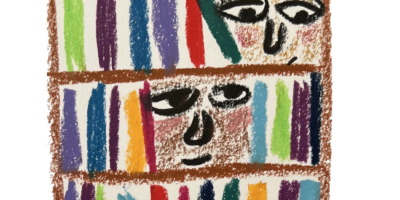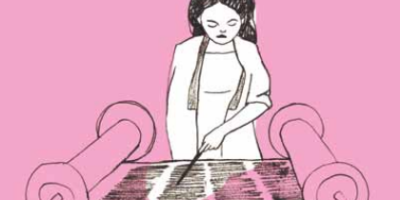
FROM THE EDITOR
WE ARE FOUR MONTHS into the most threatening time I can remember as a Jew. Israel—whose existence we Jews have had the luxury, for most of 75 years, to take as a given––has been under direct threat.
I don’t need to rehearse for you what happened, or the particular evils enacted against women. Just a short reminder here. The brutal attacks. The sadism and glee in the butchering of Jews, from infants to the elderly. The rapes, with women’s legs broken and pelvises fractured in the brutal sexual assaults. The incineration of the living. The pursuits, the mutilations, the kidnappings, the seizing of the hostages, much of it photographed by the attackers themselves.
Israel’s national anthem “Hatikvah,” “The Hope,” enunciates very clearly not a military goal but the aspiration that Jews will be able to live as a free people in our own safe place, with agency over our own lives. The existential threat many Jews outside of Israel now say they experience challenges that hope. Active danger to life and physical safety, not just affronts to identity, are unfortunately familiar—the Tree of Life synagogue murders five years ago, the public hangings and persecutions of Jews in Iran 24 years ago, attacks on Jews in North Africa, torment of Jews under Soviet rule just a few decades back, the lives and murders of traumatized relatives and ancestors in Ethiopia, in Europe, in Spain under the Inquisition. Yet the pogrom-like slaughter of Jews in the South of Israel on October 7 caused the worst loss of Jewish life in a single day since the Holocaust.
Add to these histories the nightmare of what we imagine is happening to the remaining more than one hundred hostages, including babies, young people, the elderly, alone and unprotected in Gaza. Caught in a dizzying kaleidoscope of emotions, a disorienting torquing jolts us from horror to grief, to sadness, worry, anger—and to empathy for the misery of innocents in Gaza, in particular the children, led into this awful situation by Hamas. And the loss of thousands of lives, according to the Gaza health ministry, as the Israel Defense Forces fight to bring the captives home safely while at the same time eliminating Hamas––perhaps incompatible goals, as recent protests in Israel suggest might be the case.
In my own lifetime Israel has been a constant, whether as a place to which we sent pen-pal letters in the hard years of the 1950s or as the start-up nation of the 21st century. When I was a very small girl, my paternal grandfather, whose own parents had made aliyah in 1904 from Winnipeg, Canada, to “Eretz”—“Palestine” in the English press—gave me as a gift a brass medallion inscribed with the emblem of the State of Israel. My grandpa told me that the disk had been created to celebrate the creation of the State. I still remember how confused I was by his description. Creation? We sang “Hatikvah” every day in my kindergarten. Hadn’t Israel always been there?
I’ve argued about (and occasionally with) its governments, opposed several of its policies, written about the chokehold that many of its patriarchal laws and practices have had on the lives of women and others. But until now I hadn’t felt in my rapidly beating heart that Israel’s very existence might be in question.
And now the conflict in Israel and Gaza, spreading into other regions as well, has been joined by another unwelcome source of my gnawing anxiety: I dread the comments on the news almost as much as I’ve come to dread the news itself. What hate-filled and rageful notes will appear on Lilith’s social media pages—or my own? Even social conversations have become fraught for me as for so many of you.
Here’s a recent example: A local community network in a place outside of New York City where I’ve frequently spent time shocked me this season when its “information-only; no opinions here” listserv usually a place for announcing farmers markets, local bands, lost dogs, and unwanted blenders or newly sheared sheep’s wool free for the taking—announced weekly vigils mourning the deaths in Gaza, and expressing outrage at Israel, with no mention at all of the initial attacks, the deliberate murders of babies and children and civilians of all ages that were the impetus for Israel’s incursions into Gaza. Soon the listserv was awash in “information” that veered quickly into recognizable antisemitism. I don’t mean a discussion of the flaws of nationalism or Zionism, people. I mean old cabals about what Jews control. My concern about what Israel will look like when this war ends (please may it be very soon) is now joined by a deepening uneasiness that the war in Gaza has provided a hook on which prejudiced individuals will hang their bias against Jews.
As Lilith does, we bring you the thoughts of disparate women on this situation. In “Life After October 7,” you’ll meet Israeli, American, and Palestinian women sharing their reactions to the traumatic very recent history that is being lived out even as this issue goes to press.






